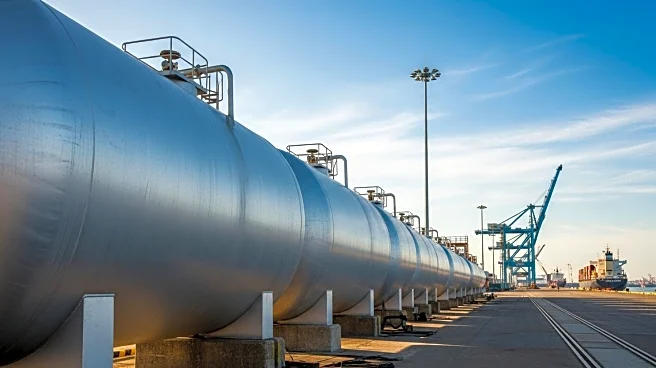What is the story about?
What's Happening?
Ports across the United States are increasingly adopting propane as a key energy source to navigate the challenges posed by fluctuating trade volumes and economic uncertainties. Propane offers a cost-effective and reliable alternative to traditional fuels like diesel and gasoline, which are subject to volatile price changes due to global market influences. The domestic production of propane ensures a stable supply chain, reducing the risk of price spikes that can strain port budgets. The West Basin Container Terminal at the Port of Los Angeles exemplifies this shift, having reduced its annual fuel costs by approximately 25% after transitioning from diesel to propane. Additionally, propane-powered equipment requires less maintenance and infrastructure investment compared to electric alternatives, further enhancing operational efficiency.
Why It's Important?
The adoption of propane by U.S. ports is significant as it provides a strategic advantage in maintaining operational efficiency and cost control during periods of trade uncertainty. By reducing dependency on volatile global oil markets, ports can better manage their budgets and reinvest savings into their operations. Propane's lower infrastructure and maintenance costs compared to electric solutions make it an attractive option for ports looking to upgrade their equipment without incurring high upfront expenses. Furthermore, propane's ability to provide consistent power and speed for material handling equipment ensures high productivity levels, which is crucial for ports experiencing record trade volumes. This shift not only supports economic resilience but also enhances energy security by reducing reliance on the electrical grid.
What's Next?
As ports continue to face unpredictable trade conditions, the role of propane as a reliable energy source is likely to expand. Ports may increasingly invest in propane infrastructure and equipment to further capitalize on its economic benefits. Additionally, the potential for increased grid instability due to aging infrastructure and rising power demand may drive ports to adopt propane-powered backup systems to ensure operational continuity during outages. The ongoing evaluation of energy strategies by port operators will likely focus on balancing cost, efficiency, and resilience, with propane playing a central role in achieving these objectives.
Beyond the Headlines
The shift towards propane not only impacts economic and operational aspects but also has environmental implications. Propane is considered a cleaner-burning fuel compared to diesel, contributing to reduced emissions and improved air quality around port areas. This aligns with broader environmental goals and regulatory pressures to lower emissions in industrial sectors. The adoption of propane may also influence the development of new technologies and innovations in the energy sector, as demand for efficient and sustainable solutions grows.
















